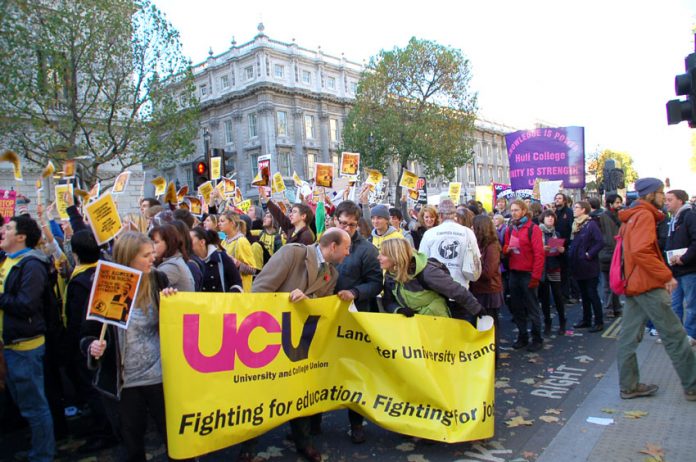
‘Well over a million students at 63 UK universities will be hit with strike action this month unless a dispute over changes to staff pensions can be resolved’, the University and College Union (UCU) warned yesterday.
The UCU announced plans for strike action in Scotland on Thursday, March 17; in Wales on Friday, March 18; in Northern Ireland on Monday, March 21 and in England on Tuesday, March 22.
There will then be a second day of strike action across the UK on Thursday, March 24.
Last week UCU members of the Universities Superannuation Scheme (USS) pension scheme at 63 universities voted for strike action and action short of a strike.
Taken overall, two-thirds (64.55 per cent) of UCU members who voted, voted for strike action and over four-fifths (82.19 per cent) voted for action short of a strike.
Following the result of the ballot, UCU general secretary, Sally Hunt, wrote to the Employers Pension Forum (EPF) to request urgent talks through the arbitration service, ACAS, to resolve the dispute and avoid the first national strike action in universities for five years.
The union has still not had a response from the employers, but said yesterday it remained hopeful of talks and a resolution without the need for action.
Members at institutions that voted for action will be asked to strike against the proposals from university employers to reduce pension benefits and increase costs even though USS is in robust health.
The union said it had to act quickly as the employers plan to bring in the changes to the pension scheme on Friday, April 1st.
UCU general secretary, Sally Hunt, said: ‘University staff really value their pension rights and have made their views of the detrimental changes crystal clear and if a settlement is not reached, they are prepared to strike to defend their pensions.
‘Strike action is always a last resort and I am ready and willing to clear my diary to meet the employers through ACAS immediately.’
Meanwhile, the GMB trade union warned that changes to public sector pensions ‘will lead to strikes’.
Commenting on leaked reports of the contents of Lord Hutton’s review of public sector pensions, due to be published today, it said: ‘Hutton is predicted to repeat his interim report argument that public sector workers should pay more. However, he believed a one per cent increase was appropriate.
‘Since then George Osborne has unilaterally decided on a 3.2 per cent increase which it is now known will lead to a mass exodus of scheme members – jeopardising pension schemes and raising costs for taxpayers. It’s effectively a tax on pension scheme members.
‘This is the biggest issue of all. Will Lord Hutton criticise the government’s 3.2 per cent proposal as he should or will he duck the issue? This matter is already leading to calls for strikes.’
l Work and Pensions Secretary Iain Duncan Smith yesterday announced that the government is to ‘fundamentally simplify’ the state pension by replacing complicated top-ups and means-testing with a flat-rate payment.
In a speech to Age UK, Duncan Smith did not reveal a figure for the new flat-rate pension, although this is widely anticipated to be £140 per week per person.
Currently, the state pension is £97.65 per week for men and women, with additional pension credit topping this up to £132 per week subject to means testing.
TUC General Secretary Brendan Barber said: ‘Unless the government is putting a lot more cash into this reform there are likely to be as many losers as winners.
‘We need to see the small print before the celebrations start. Experience shows that when something sounds too good to be true, it usually is.’